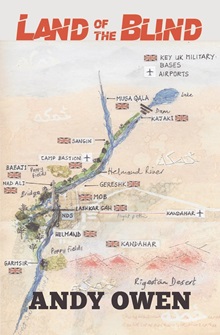The majority of the book is set in 2007 but there is a post-script detailing your characters’ involvement in the chaotic coalition departure of 2021. Was it this ending of the coalition efforts that gave you the impetus to publish the book now?
I wrote most of the book in 2019. I wanted to set the story within the right personal and historical context. I could only do this a certain distance in time away from the events I was describing. This is not unusual. Some of the books that most influenced me were written a significant time after the events they cover. Joseph Heller began writing Catch-22, based on his Second World War experiences in 1953 (it was published in 1961). My favourite novel about the Vietnam War, Tim O’Brien’s The Things They Carried was published in 1990. I was trying to secure a publisher when Kabul fell in 2021. This gave me the opportunity to add the postscript and provide a better end to the stories of the Afghan characters. Adding the postscript after I had written the novel worked well. The narrator is a decade older. His life has changed significantly. Whilst the gap between writing the two sections was less, it made it easier to subtly change the voice of the narrator.
It is sometimes said that history doesn’t repeat but it echoes. Do you think the coalition forces could and should have learned more from the previous disastrous expeditions into Afghanistan – both British and Russian?
If policy makers had studied the three Anglo-Afghan Wars of the nineteenth and early twentieth century, they should have come understand the lesson that was learnt from bitter experience across those conflicts: it is best to keep interventions in Afghanistan short. Battlefield victories are achievable with the right resources, but occupation is unwise.
There was also a wealth of material in sitting in the British Library written by soldiers and diplomats from those wars describing in detail the customs, traditions, and culture of a people we needed to understand to operate effectively. We never read that material and never really understood the people we were either fighting or meant to be helping.
A wider reading of history would have also shown that our often-conflicting aims were mostly utopian in nature. History shows that attempts to create utopias through violence results in failure or produces societies more dystopian in nature. History makes more sense as a cycle than as a straight line of progress, and there is a right or wrong side of history to be on. This is something that the Afghans I met in Helmand intuitively grasped better than we, the forgetful invaders, did. They saw our arrival as another phase in the ebb and flow of our presence in the region, picking up from those previous wars. The shifting alliances of tribal and political leaders to meet their own changing needs frustrated our diplomats and military leaders who couldn’t work out whose ‘side’ they were on.
What do you think were the unique challenges about the conflict in Afghanistan and was it these challenges that made you chose this conflict to write about as opposed, for example, to your experiences in Iraq or Northern Ireland?
The gap of understanding between the occupying force and the occupied people was greater in Afghanistan than in any other conflict I experienced, and exponentially so. It was a highly local conflict, fought village to village, province to province, in which personal loyalties, honour and grudges were much greater motivators than any over-riding ideology making the level of ethnographic understanding required to understand the battlefield so much greater than we could ever hope to achieve in 6-month tours.
Since leaving the army, you have written widely on the philosophy and ethics of warfare. Do you think what you have learned or researched in writing about these topics has changed the way you reflect on your past experiences? Or indeed, vice versa?
Philosophy helped me reflect but also helped me in the moment. My experiences have also influenced by philosophy.
Philosophy is not for every soldier. And not all philosophy is of use to a soldier in action. Knowledge of Hegel’s dialectics won’t help much when receiving incoming fire in a platoon house in Sangin. Yet, for me, facing morally difficult decisions in a warzone made me realise the subjective values that had influenced my thinking. Acts that I saw as inherently right or wrong in the comfort of home suddenly didn’t seem so black and white. A deeper knowledge of philosophy would have made me a better soldier. As we practice weapon handling in training so it becomes second nature in combat, we can think through complex dilemmas before we deploy so when we face both similar and new dilemmas on the battlefield, we can deploy our ethical response – rules or frameworks of thinking – as second nature, or at least our thinking muscles are exercised and have access to a variety of intellectual tools to deal with the novel.
Your main character in the book reflects on his worry that Afghanistan – as an ultimately unsuccessful conflict- is at risk of being forgotten. Would you say it is as important for a nation to remember its military failures as its successes?
We remember the victory against the Spanish Armada, but we do not remember the English Armada a year later, when Spanish resistance, a lack of landing craft, and disease killed ten thousand English soldiers and forced a retreat, with only some stolen wine to show for it. Most Brits will know of the Royal Navy’s dominance of the seas achieved by the time of the Fourth Anglo-Dutch War in the eighteenth century, but few will know of the “Raid on the Medway” during the Second Anglo-Dutch War when a Dutch raid caused a “national humiliation” when they captured the pride of the English fleet, the Royal Charles.
Our victories are part of our national story and help bind and inspire. However, if we forget our defeats, we leave ourselves open to hubris, and vulnerable to those who would use our victories to convince us to repeat our mistakes.
In the book you create compelling characters amongst the ranks of the Afghan security services. Was it important to you to bring out Afghan perspectives on the conflict? Do you feel the people whose country the coalition were there to protect get overlooked too often?
Yes, as much as we neglected Afghan perspectives on decisions being made when we were in Afghanistan, there are few Afghan characters in the novels and memoirs written by those who took part in the war. Even when considering the oral tradition, there are even fewer novels by Afghans who fought alongside coalition forces. Where some of the powerful Afghan voices emerge is through traditional landays. These short poems have been sung aloud in Afghanistan for thousands of years, but are now updated to address themes of love, grief, war, drones, and the Taliban.
Are there any other classic war novels that you have taken inspiration from?
The dark absurd humour of Heller’s Catch-22 was a key inspiration as well as several memoirs by soldiers, including Robert Graves’ Goodbye to all That and Norman Lewis’ Naples ’44: An Intelligence Officer in the Italian Labyrinth.
If people want to know more about the Afghanistan conflict, do you have any recommended reading?
Peter Hopkirk’s The Great Game, tells a story of adventure, intrigue and how Afghanistan became the centre of great power conflict between the British and Russian Empires, and highlights aspects of Afghanistan’s history that still influence today. I would also recommend Adam Curtis’ documentary Bitter Lake for the kaleidoscopic images of Helmand in the 1950s alone, but also for tracking some of the policy decisions over the second half of the twentieth century that led to our deployment to Afghanistan.
To get an Afghan perspective I would recommend A Thousand Splendid Suns by Khaled Hosseini, the sweeping multi-generational story gives rare insight into the lives of ordinary Afghan women, as does I Am the Beggar of the World: Landays from Contemporary Afghanistan.
Andy Owen is the author of Land of the Blind.







